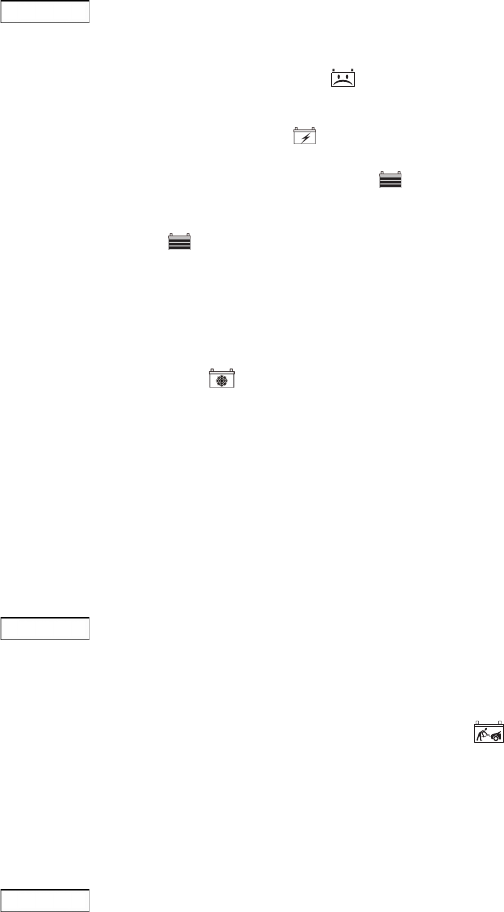
• 7 •
Desulfation Mode
IMPORTANT
Battery must be removed from the car when using this mode, or damage to
the car’s electrical system may result.
If the battery is left discharged for an extended period of time, it could become sulfated
and not accept normal charge. If you select , the charger will switch to a special
mode of operation designed for sulfated batteries. If successful, the charger will fully
desulfate and charge the battery, then the green LED will go on. If desulfation fails, the
charger will abort and the CHARGING (yellow) LED will blink.
Completion Of Charge
Charge completion is indicated by the CHARGED LED. When lit, the charger has
stopped charging and switched to the Maintain Mode of operation.
Maintain Mode
When the CHARGED LED is lit, the charger has started Maintain Mode. In this
mode, the charger keeps the battery fully charged by delivering a small current when
necessary. The voltage is maintained at a level determined by the battery type selected.
NOTE: If the charger has to provide its maximum maintain current for a continuous 12
hour period it will go into Abort Mode. This is usually caused by a drain on the battery
or the battery could be bad. Make sure there are no loads on the battery. If there are,
remove them. If there are none, have the battery checked or replaced.
Maintaining a Battery (3A Charge Rate)
This charger has a maintenance setting that maintains both 6 and 12 volt batteries,
keeping them at full charge. On this setting, it can charge small batteries and maintain
both small and large batteries. We do not recommend charging a large battery on the
maintenance setting.
NOTE: The maintain mode technology utilized in Schumacher’s chargers allows you
to safely charge and maintain a healthy battery for extended periods of time. However,
problems with the battery, electrical problems in the vehicle, improper connections
or other unanticipated conditions could cause excessive current draws. As such,
occasionally monitoring your battery and the charging process is recommended.
Using the Engine Start feature
Your battery charger can be used to jumpstart your car if the battery is low. Follow these
instructions on how to use the ENGINE START feature.
IMPORTANT
Using the ENGINE START feature WITHOUT a battery installed in the
vehicle could cause damage to the vehicle’s electrical system. NOTE: If you have
charged the battery and it still will not start your car, do not use the ENGINE START
feature, or it could damage the vehicle’s electrical system.
1. With the charger plugged in and connected to the battery and chassis (see section 6),
press the CHARGE RATE button until the ENGINE START
LED is lit.
2. This product is rated for 3 seconds of engine cranking.Crank the engine until it starts
or 3 seconds pass. If the engine does not start, wait 3 minutes before cranking
again. This allows the charger and battery to cool down.
NOTE: During extremely cold weather, or if the battery is under 2 volts, charge the
battery for 5 minutes before cranking the engine.
3. If the engine fails to start, charge the battery for 5 more minutes before attempting to
crank the engine again.
IMPORTANT
Do not leave the charger in Engine Start Mode for more than ten minutes at
a time, or you may damage the charger.
4. Clean and store the charger in a dry location.
NOTE: If the engine does turn over but never starts, there is not a problem with the
starting system; there is a problem somewhere else with the vehicle. STOP cranking the
engine until the other problem has been diagnosed and corrected.


















